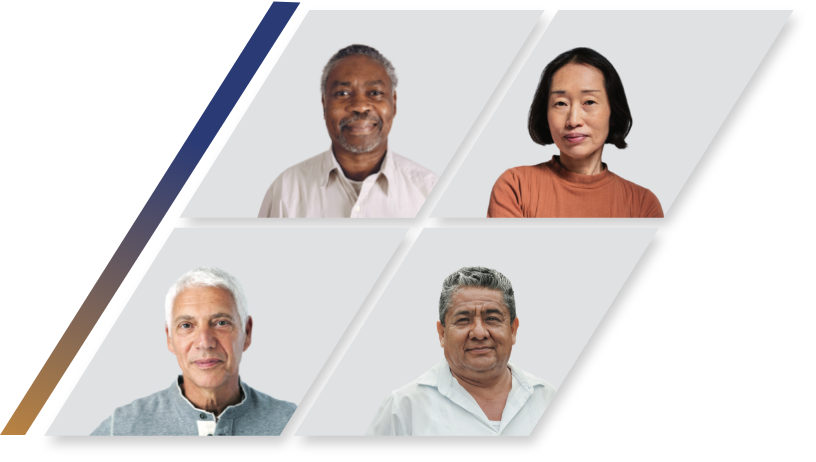A NEW STUDY FORPeople Living With Head and Neck Cancers That Have Come Back or Spread

About STELLAR-305
STELLAR-305 is a . The study aims to find out how a combination of two drugs works as the first treatment for head and neck cancers that have come back (recurrent) or spread to other parts of the body (metastatic).
Research studies help scientists and doctors learn more about medical conditions and study drugs. This study will help researchers learn if the study drugs are safe and if they work to treat head and neck cancer(s) in many different types of people.

Contact Us
Call Exelixis Medical Information at 1-888-393-5494 (toll-free) or 1-303-389-1847, or email medinfo@exelixis.com to learn more about this study.

Who Can Join the STELLAR‑305 Study?
Each research study has clear guidelines on who can and cannot join. This is called eligibility criteria. People with head and neck cancers may be able to take part in STELLAR-305 if they:
- Are 18 years of age or older
- Have head and neck cancer(s) that continue to grow or spread
- Have not had treatment for head and neck cancer(s) yet or had treatment before the cancer(s) started growing or spreading
There are other eligibility requirements you must meet to join the study. Download the STELLAR-305 Discussion Guide and talk with your doctor treating your cancer to learn more.
Talk with your doctor to learn if this study may be an option for you.

Discussion Guide
(Questions for your doctor)
To find out more about joining the STELLAR-305 trial, download the Discussion Guide with questions that will help you talk with your doctor.
Participation = Representation
It is important that diverse groups of people take part in research studies. Studies should include people of different ages, races, ethnicities, and genders. Having diverse groups represented in research helps show if study drugs are safe and work well for all types of people likely to use the drug(s).
People from different backgrounds can experience head and neck cancer differently. For example, in the U.S., Black people are more likely than White people to have advanced-stage head and neck cancer when their cancer is diagnosed.1 Diversity in studies can help us understand and address these types of differences.

Diversity in research can help lead to advances in cancer care for everyone.
Learn More About the Study
People enrolled in STELLAR-305 will be randomly assigned to one of two treatment groups by chance. Each group will be treated with different study drugs for recurrent or metastatic head and neck cancers. People will not know which group they are assigned to and which treatment they will receive.
Volunteering for a study is a personal choice. Talk to a healthcare professional you trust about clinical trials as a treatment option.


Group A
Will get the investigational treatment being studied: zanzalintinib in combination with pembrolizumab.


Group B
Will get a drug that is approved for head and neck cancer(s): pembrolizumab.
Participants in this group will get pembrolizumab in combination with a .

A computer will randomly assign each person enrolled in the study to a treatment group. Each group will be treated with different drugs.

Group A (investigational group) will get zanzalintinib in combination with pembrolizumab.

Group B (control group) will get pembrolizumab in combination with placebo (sugar pill).
THE COMBINATION OF ZANZALINTINIB AND PEMBROLIZUMAB HAS NOT BEEN APPROVED BY THE U.S. FOOD AND DRUG ADMINISTRATION (FDA). THE SAFETY AND EFFECTIVENESS OF THIS STUDY TREATMENT HAVE NOT BEEN PROVEN AND ARE BEING REVIEWED OR EVALUATED AS PART OF THIS CLINICAL TRIAL.
Frequently Asked Questions
If this is the first time you are thinking of participating in a clinical trial, you may have questions. Visit our FAQs section to learn more.

ClinicalTrials.gov
Find out more about STELLAR-305 on ClinicalTrials.gov. Search for NCT06082167.
Is There a Clinical Study Site Near Me?
STELLAR-305 will take place in the U.S. and abroad. For specific location and site information, and to confirm whether sites near you are still enrolling new participants, call 1-888-393-5494 (toll-free) or 1-303-389-1847, or email medinfo@exelixis.com.
Currently open or planned study site locations:
Study sites may stop enrolling patients at any time. Please check back if you do not see a study site located near you.
Resources
The following third-party organizations can provide information and resources for people living with recurrent or metastatic head and neck cancers. They provide educational materials, including webinars and participant guides, and information about support groups.
Cancer.gov
Information from the National Cancer Institute (NCI), the U.S. government’s principal agency for cancer research.
CancerCare
Founded in 1944, CancerCare is the leading national organization providing free professional support services and information to help people manage the emotional, practical, and financial challenges of cancer.
Head and Neck Cancer Alliance
The Head and Neck Cancer Alliance (HNCA) provides hope and support to individuals impacted by head and neck cancer, raises awareness about prevention and early detection, and advocates for improved patient outcomes.
THE COMBINATION OF ZANZALINTINIB AND PEMBROLIZUMAB HAS NOT BEEN APPROVED BY THE U.S. FOOD AND DRUG ADMINISTRATION (FDA). THE SAFETY AND EFFECTIVENESS OF THIS STUDY TREATMENT HAVE NOT BEEN PROVEN AND ARE BEING REVIEWED OR EVALUATED AS PART OF THIS CLINICAL TRIAL.
Reference
1.Taylor DB, Osazuwa-Peters OL, Okafor SI, et al. Differential outcomes among survivors of head and neck cancer belonging to racial and
ethnic minority groups. JAMA Otolaryngol Head Neck Surg. 2022;148(2):119-127. doi:10.1001/jamaoto.2021.3425